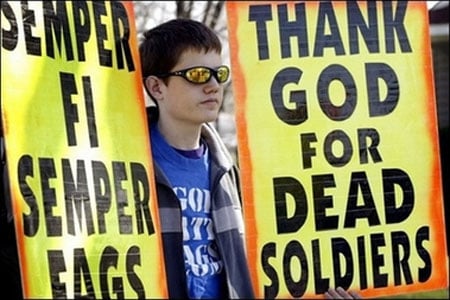To some, the Westboro case is simply about homophobia run amok. From a more Constitutional level, however, it's about whether their hate should be protected by the First Amendment, a subject that has been reinvigorated by Terry Jones, the extremist pastor who planned to burn the Qur'an on 9/11.
Lawyer and former Time magazine writer Adam Cohen sums up the constitutional dilemma quite well:
Even for the most committed civil libertarian, it is hard to get excited about defending a hate-spewing minimob that targets the funeral of a dead soldier or signs saying, "God Hates the USA. Thank God for 9/11." Still, it is important for the court to rule that this kind of expression lies within the First Amendment. We defend it not because these ideas are particularly worthy of being protected, but because all ideas, even the most loathsome, are.
The Supreme Court ruled 8-1 last year that animal cruelty videos are protected forms of speech, a ruling that may provide insight into how they'll view the Phelps case. We should all be asking ourselves, then, whether we want to throw our support behind the First Amendment, or whether we think Constitutional restrictions are worth sending a message: hate speech has no place in the United States.
Snyder and his lawyers, who have the "friend of court" support from a disparate group of politicians, including Democrat Barbara Boxer and typically anti-gay Republican David Vitter, are well aware of the Constitutional handicaps they face, which explains why they're framing their argument as an invasion of privacy and as an issue of another Constitutional guarantee, Freedom of Assembly.
Which way do you think the Court should rule, reader? Are free speech rights worth curtailing to end the Westboro Baptist Church's' reign of terror?
Here's the PDF of the Snyder's SCOTUS brief.

Fred Phelps and his merry band of Westboro Baptist homophobes will head to the Supreme Court next week, again raising ever-important questions about the state of free speech.
The case, Snyder v. Phelps, revolves around the Phelps clan's protest outside of a fallen soldier Matthew Snyder's funeral. Matthew's father, Albert, sued Phelps, saying the protests and subsequent actions, including a poem excoriating Matthew, caused mental distress, aggravated his diabetes and made him violently ill during his only son's funeral.
A judge three years ago ruled in Snyder's favor, and ordered Westboro Baptist Church to pay the soldier's family a little under $11 million. That ruling, however, was overturned, bringing the case to the high court.



